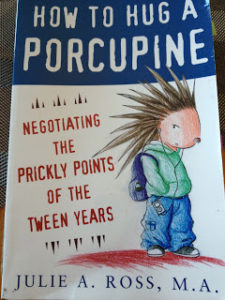I consider myself an avid reader. This is both because I simply LOVE reading and also because of the field I work in; psychology/psychotherapy is one of the disciplines with very vast literature choices, which sometimes feels like falling into an endless well. If you read one book, that makes you curious about five others and your to-read list increases exponentially.
Since I work with children and their parents, a good parenting book that offers parents practical tools on how to deal with daily parenting issues is like a treasure to me. Here is a little bit about How to Hug a Porcupine by Julie A. Ross.
What struck me first about this book is the title. I haven’t come across any better description for the tween years. Please notice the humorously illustrated child on the cover. I personally found it quite funny and “telling”.

- If you have a tween, anticipate the earthquake. Say to yourself, ” This is normal and to be expected.”
- What you say and what “she/he” hears can be quite different. For example, a simple question like, “Is your homework in your bag?” might be heard by your child as ” I don’t trust you.”
- Become aware of the communication blocks and recognize your contribution to the negative cycles.
- Change your communication style and consider this as learning a new language, which means, practice, practice, practice, until you don’t sound phony.
- Use encouragement (not praise) to boost self-esteem and to promote a healthy level of independence.
- Raising kids is like planting seeds. Patience, faith and appropriate support are essential elements.
This short review doesn’t do the book justice. If you read the book, you will find tons of practical techniques and advice as well as anecdotes from real parents and as a result you won’t feel “defeated” and “alone” with your struggles anymore. Whether you deal with defiant behaviors, the computer “addiction”, sibling rivalry or the push for independence, you will find valuable information and tools to handle your “porcupine”.
